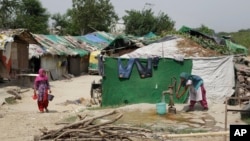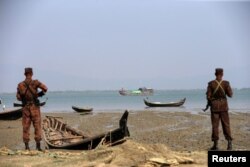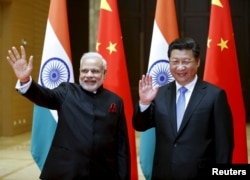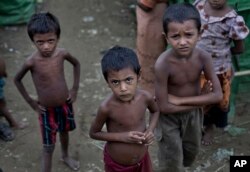Human rights groups are calling on India to take a lead in addressing the crisis faced by tens of thousands of Rohingya refugees who have fled Myanmar after a senior minister said New Delhi plans to identify and deport those living in the country.
Calling them illegal immigrants and a security threat, junior Home Minister Kiren Rijiju said India will send back an estimated 40,000 refugees regardless of the fact that some 16,500 are registered with the United Nations.
The statement in parliament brought immediate expressions of concern by the United Nations and rights activists. The spokesman for U.N. Secretary-General Antonio Gutteres said refugees should not be returned to countries where they fear persecution.
Where do Rohingya refugees go?
Outside parliament, New Delhi has been tight lipped on the sensitive issue, and not offered any specifics on how and where it will deport the refugees who escaped alleged killings and persecution in Myanmar. But it has said it is in talks with Bangladesh and Myanmar on the deportation plan.
“If they say they want to talk to Myanmar and Bangladesh to resolve the Rohingya issue, that is very welcome. If they say they are going to talk to merely deport 40,000 desperate people, that is really, really shocking,” said South Asia Director of Human Rights Watch, Meenakshi Ganguly.
International pressure
New Delhi says it is it is not a signatory to the accord on refugees, but rights activists say India must abide by international obligations and point out that the number of refugees in India is far smaller than in neighboring Bangladesh.
The outcry has prompted New Delhi to step back slightly. A Home Ministry official who did not want to be named said initially it is only asking the states through which they are scattered to draw up a list of refugees. Most of those living in India have come across in the last five years from Bangladesh.
The United Nations Refugee Agency (UNHCR) in New Delhi says it has not received any official communication from the Government about deportations and there are no reported instances of deportations of registered Rohingya so far.
While India is home to tens of thousands of Tibetan and other refugees, the Rohingya refugees, who are largely denied citizenship rights in Myanmar, have been red flagged as a security concern in a country that fears the Muslim minority may be radicalized by Islamic terrorist groups.
Myanmar involved
In Myanmar, government spokesman Zaw Htay told VOA that New Delhi has been in contact with its ambassador. Calling the issue "very complicated," he said Myanmar would have to clarify the citizenship of those living in India.
He also said any plan would have to go through the Ministry of Foreign Affairs and then to the leadership before decisions were made.
The issue has come under the spotlight ahead of a scheduled visit by Indian Prime minister Narendra Modi to Myanmar next month.
Saying the Rohingya issue needs a long-term solution, Ganguly of Human Rights Watch said, “India, as an important player in the region, also has a very strong voice and should now be using that to solve this.”
However, political analysts in New Delhi say the contentious issue is unlikely to figure at a high level as Modi’s main objective is to build ties with a country where China has influence.
“India has gone a bit more cautious,” said South Asia expert at the Institute of Defense Studies and Analyses, Sukh Deo Muni. He said probably some mechanism has been worked out to get the Rohingyas back through mutual consultation. “Of course they don’t want to go because they feel more secure here, but it will be done very gently,” he said.
Big problem for all
India concedes that sending back the refugees to a country that refuses to recognize them as its citizens is a problem. Minister Rijiju told an interviewer “We can't throw them out just like that. We can't dump them in the Bay of Bengal."
As the recent statements by India add to uncertainty and fear among the Rohingya refugees in India, the questions that echoes across camps is “where will we go?” It is highly unlikely that Myanmar will accept them back.
The treatment of hundreds of thousands of Rohingya in Myanmar has emerged as a contentious human rights issue as the country makes a transition from decades of harsh military rule to democracy.
Myanmar's de facto leader Aung San Suu Kyi has been criticized for not speaking out more about the problem, even as the military conducts operations against Rohingya militants that have resulted in widespread claims of human rights abuses. The government has denied the allegations.
Joe Freeman contributed to this report from Yangon.








